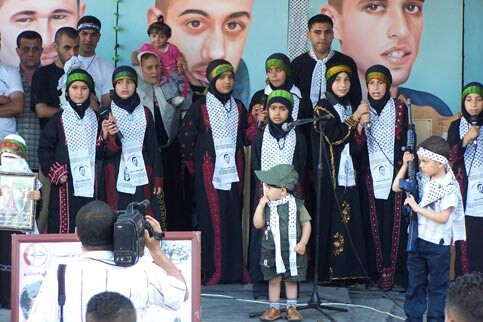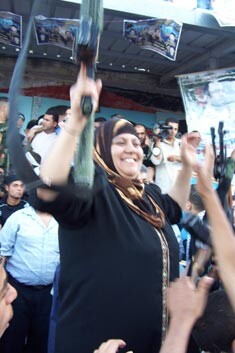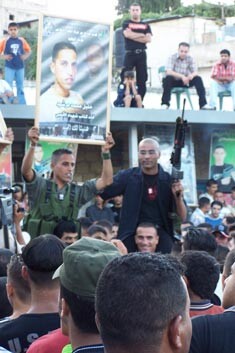
On Friday 17th June Balata Refugee Camp commemorated the first anniversary of the assassination of Kalil Marshood. Perhaps 5,000 people sat in the hot afternoon sun to watch as bands played, youths performed plays, small girls sang, masked wanted-men saluted, fighters fired in the air and women old enough to be grandmothers danced with guns waived aloft, to a backdrop of rousing music and giant banners.
The people had gathered in tribute to the life of a twenty four year old newly-wed known and loved as much for his work for his community, particularly with the children of the camp, as for his membership of the Al Aqsa Martyrs Brigade, a Palestinian resistance group. The three-storey portrait lowered from the top of the school building showed just how much he meant to people here.
I was more moved than I had expected to be. Nearly 400 people from the camp have been killed in this intifada, why should this memorial have been any different from the others I attend regularly? I can’t say I knew Kalil, and I’m sure it wasn’t just that he was much loved by someone close to me, who found the whole event so difficult that he had to leave to be alone in the cemetery. Nor was I unusually touched by the silent stifled tears of Kalil’s wife, still only eighteen and living with her parents once more.


Kalil’s mother’s evident state of trauma was hard to watch but I’ve become accustomed to mothers’ grief here. His friends, anxious for a successful event, became fractious and squabbled. My feelings came from something different. The power of the emotion of thousands of people, so many of whom had lost brothers, sons, daughters similarly, who bore the heat to honour this man, overwhelmed me.
What was different about Kalil? He was loved far more than the other fighters, who have themselves become icons. Whilst he was, is, an emblem of resistance, he was more than a folk hero. Something about Kalil gave him a place in people’s hearts beyond that of all the other boys who fought and sacrificed their lives to defend their homes and families. Kalil was loved. Kalil was good.
While the Israeli forces invaded the camp, Kalil joined volunteers at children’s parties. More than that, he was respected. With morals and wisdom he ensured that the fighters in his command did not harm their reputation by posing in stylish surroundings for journalists or girls, or swagger cockily in the streets with their weapons. Despite his youth, he controlled them wisely, safeguarding them against abusing the power and status that their guns give them in a society whose infrastructure has long since been bombed out by Israeli forces and whose traditional power structures are continually undermined by the humiliation of occupation.
Kalil gave people hope, not only from his successes with the brigade but from his leadership and from his very nature. Kalil made people feel not just that the occupation could be overcome but that Palestine could have a future, Palestine could be a viable, ordered and just state. He gave people hope for a tolerable future. In the days of betrayal by Palestinian politicians, Kalil’s absence leaves a gap which has yet to be filled.
Most of you on this email list will never have seen a taa’been. I use the Arabic word as I can’t translate it faithfully in one English word. It’s a memorial event held for the anniversary or forty days after the death, usually of a martyr. The taa’beens I have been present at usually involve a gathering in the street or community centre. Anyone can come and sit in front of the stage, facing the backdrop of portraits of the martyrs, as resistance music is played while friends, family and fighters sing and make speeches in tribute to the dead, pledging to carry on their work. Nobody cries, the atmosphere is closer to that of a wake than a western funeral. Women ululate and boys discharge dozens of expensive rounds from their guns.
At Kalil’s taa’been there was more dancing than I’ve seen before. His identical twin Esmael and the fighter Ahmad Abu Ras were raised on shoulders to waive pictures or guns. Even Kalil’s normally shy brother Bassam joined in. But there was also more sadness than I’ve seen openly expressed before. Imm Mohammed, mother of two “wanted” sons and another in the gaol, always near the microphone to make rallying speeches or ululate, and first of the women to hold an M-16 aloft, wiped many tears from her cheek and held her face in despair, before recovering her renowned strength to lead another chant of “Belroah, bedam, nafdeeke ya shahid!” (with our soul, with our blood, we will honour you the martryr)
I feel uncomfortable joining in with the emotion of the occasion. Not because it’s not really my grief to share, the people are too welcoming and glad for witnesses to make me feel that, but because I have uneasy feelings about anything that glorifies fighters here. I certainly don’t dispute their right to defend their homes and resist the oppression of occupation and I can see that resistance gives hope to ordinary people, making their lives a little less intolerably wretched. Rather, my discomfort comes from the futility of their efforts. They will fight to defend themselves with everything they have, sacrificing their own lives in the hope of alleviating the plight of those close to them. But I believe they cannot win on military terms. How can M-16s, Kalashnikovs or explosives strapped to their own bodies succeed against tanks, fighter jets and billions of dollars of military aid annually from the US and elsewhere? Palestinians who chose to be armed fighters quickly become wanted by the Israeli authorities. Hiding, barely seeing their families, they have no life even before they are killed. Their self sacrifice serves to give hope and we treasure them, but how can I encourage them when I fear they die in vain?
The next day I delivered the photos I took at the taa’been to Kalil’s mother. She sat with me, surrounded by yet more pictures of Kalil, in the room of her house that is now a memorial to him. She played a DVD of the forty-days taa’been for Mohammed Awaiss.
Kalil himself had been present, waiving gun and pledging. He lived less than another three months. A year later his mother continues to replay the tapes, living in the home she has turned into a shrine for him. Morbid and unhealthy? Perhaps not. What else can she do? When everything in your life has been taken by an army you cannot defeat, when there is no hope left for a normal life in future, what else is there but to worship god and dead heroes?
Chris Smith is a European citizen living in Balata Refugee Camp.
